View cart “Cooper Plain Kalash” has been added to your cart.
Hot
Previous product
Back to products
Gulal Powder
₹30.00 – ₹55.00
Next product
Om Thali in Copper
₹500.00
Vibhooti Powder
₹60.00
Description
- The sacred ash made of burnt dried wood in vedic rituals. In Sanskrit, bhoothi means Aishwaryam, meaning wealth, treasure, precious. Vi-bhoothi means very or more valuable.
- A person who smears Vibhuthi purifies himself from sins and also removes the sins of persons who looks at him besmeared with Vibhuthi or theeruneru. Vibhuti is the sacred ash used in religious worship.
- The main ingredient of Vibuthi is a special kind of wood. It is burned in a sacred fire (Homa) to form white ash.
- It serves as a reminder to the believer to cast away selfish and worldly desires that wrap the self in maya, and calls to mind the story of how Shiva burned Kama (the god of desire) to ashes when Kama attempted to break Shiva’s focus on the divine truth.
- Normally, worn along with red tilaka. Vibhuti relates to Shiva and red tilaka to Shakti. Reminds that Shiva and Shakti form the universe and everything is though the union of Shiva and Shakti.
Quantity
- 100 gms
Categories: Daily Pooja Ingrediants, Pooja Ingrediants
Related products
Cooper Plain Kalash
₹650.00
Description
- The Kalash symbolically represents creation. The vacant pot, symbolizes earth, and the water filled symbolizes the primordial water from which life began on earth.
- It is filled with water (preferably the water of holy Ganga, any sacred river or clean, running water).
- Its top open end holds betel or mango leaves and a red-yellow sanctified thread (kalawa or mauli) is tied around its neck.
- This kalash is placed on the pujavedi (worship dais or table) near the idols or pictures of the deity. It is placed facing the North, in the center.
- This positioning signifies balance; balance that one needs to achieve success in every walk of life.
- Often it is topped by a coconut or a deepak and kept on the sacred Vedic swastika symbol or a Vedic swastika is drawn on it by using wet vermillion, sandal-wood powder and turmeric.
Specifications
- Material: Copper
- Pack of - 1
- Size - (Top W x H): 8.5 x 9 cm
- Weight - 118 g
Turmeric Powder (Haldi)
₹30.00 – ₹55.00
Description
- Turmeric is considered highly auspicious in India and has been used extensively in various Indian ceremonies for millennia.
- Even today it is used in every part of India during wedding ceremonies and religious ceremonies
- Turmeric has played an important role in both Buddhist and Hindu spiritualism. The robes of the Buddhist monks were traditionally colored with a yellow dye made of turmeric.
- It is used in pooja to make a form of Lord Ganesha.
- Ganesha, the remover of obstacles, is invoked at the beginning of almost any ceremony and a form of Ganesha for this purpose is made by mixing turmeric with water and forming it into a cone-like shape.
- It is offered to Gods during pooja.
Quantity
- 50 gms , 100 gms
Kumkum Powder
₹30.00 – ₹55.00
Description
- Kumkum is applied to the forehead.
- The reason for this particular location has to do with the ancient Hindu belief that"the human body is divided into seven vortices of energy,called chakras,beginning at the base of the spine and ending at the top of the head.
- The sixth chakra, also known as the third eye,is centered in the forehead directly between the eyebrows and is believed to be the channel through which humankind opens spiritually to the Divine".
- Thus,the kumkum is placed at the location of the body which is the most holy.
Uses
- Kumkum powder is widely used for worshiping the Hindu goddesses,especially Shakti and Lakshmi.
- Saivites- Followers of Siva usually apply three white horizontal lines with a dot of kumkum at the center.
- Vaisnavas- Followers of Vishnu make use of "white clay to apply two vertical lines joined at the base and intersected by a bright red streak." Many times the white clay is applied in a U-shape.
- Swaminarayana- Followers of the Swaminarayana apply kumkum at the center of the forehead and in between a U-shaped tilaka.The tilaka is normally yellow and made from sandalwood.
- When a girl or a married woman visits a house,it is a sign of respect (in case of an elderly lady) or blessings (in case of a young girl) to offer kumkum to them when they leave.
- When visiting a temple or during a pooja,apply a dot on your forehead.
- In most of India, everyday, married women apply red kumkum in front of their parting on their forehead as a symbol of marriage
Quantity
- 50 gms , 100 gms
Navadhanya
₹35.00
Description
- Navadhanya signifies the nine grains (where ‘Nava’ means nine and ‘Dhanya’ means grains) that are an important part of an Indian’s staple food.
- They are offered to the Navgrahas (9 planets). They are also part of other Hindu pooja and rituals. The Navadanya includes Bengal Gram, Wheat, Horse Gram, Green Gram, Rice, White beans, Black Seasame seeds, Chic Peas, Black Gram.
- Usage of Navadhanya as a Hindu pooja item is a ritual followed during specific occasions such as the Grahapravesam or house warming ceremony and also during the Navaratri festival.
Uses of Navadhanya for Grahapravesam
- The Grahapravesam or house warming ceremony is a ritual performed before someone starts living in a new house.
- Sometimes, a Grahapravesam may also be performed if the house or a portion of the house has been rebuilt, or if someone is coming back to live in the house after being away in a different place for a long number of years.
- The objective of performing this ritual is to invoke the blessing of the gods to grant happiness, peace, prosperity and longevity to the people who are going to live in the house.
- During this ritual, the Navadhanya is one of the essential Hindu pooja items. These nine grains are placed in a pot filled with water along with a one rupee coin and a coconut is then placed on top of the pot. The priest then performs the pooja ritual after which this pot is taken inside the house and placed near the homam fire.
Use of Navadhanya during Navarathri festival
- Navadhanya is also an important part of the Navarathri festival which is celebrated for nine continuous days in worship of the Hindu goddesses.
- “Kolu” is a significant aspect of this festival where different idols are arranged such that they signify different stories from the various epics in the Hindu religion. Pooja will be performed for the idols placed in the Kolu every evening and neighbors will be invited to visit the Kolu and sign hymns in praise of the gods.
- Each evening one of the Navadhanya will be cooked and offered to the deity and visitors in the form of “Sundal”.
- The Kolu custom and evening pooja is incomplete without a sundal made from one of the Navadhanyas.
- Apart from the spiritual or religious beliefs of well being when using a Navadhanya, intake of these grains has excellent health benefits.
Quantity
- 125 gms
Darbha Grass
₹215.00
Description
- Darbha Grass or Kusha Grass is scientifically known as Desmostachya bipinnata, commonly known in English by the names Halfa grass, Big Cordgrss, and Salt read-geass, is an Old World Perennial Grass. Kusha grass is a special type of grass which is used in Hindu rituals Pooja and Worship.
Uses
- While chanting hymns, hold a bunch of Darbha grass, dipping the tip into a pot full of water. The positive vibrations of the mantras recited are believed to be absorbed by water in the pot through the grass. Then the recharged water is sprinkled around to purify the surroundings.
- Also, while performing fire ritual, Darbha grass is placed on the four sides of the agni kund or sacred fireplace, While chanting and reciting verses from the Vedas, one has to wear a ring made of Darbha grass on one’s right hand ring finger as a protective shield from negative vibrations.
- The number of Darbha leaves used depends on the ceremony that is being performed. For ceremonies related to death, only one Darbha leaf is used. For auspicious and daily rituals, a ring made of two leaves is used for inauspicious but not death related functions — Amavasya Tharpanam, Pithra Pooja — a three - leaf Darbha ring is used. For temple prayers and pooja, a four-leaf Darbha ring is used.
Quantity
- Set of 5
Clove, Cardamom, Betelnut
₹95.00 – ₹210.00
Description
- Pack of cloves (long), cardamom (elaichi) and betelnut (supari) for use in daily pooja and rituals.
Used
- Clove in pooja rituals for fulfillments of desires and success in work (karya siddhi).
- Cardamom has a special aroma, which is pleasant and is used to attract and invoke deity energies.
- The betel nut is an integral part of the daily or ritualistic Pooja.
- It is also popularly used in the age old- custom of Indian eating.
- The supari is symbolic of the nut of the ego that must be offered on the altar of God.
- It represents the hard, coarse qualities that must be surrendered to God, leaving only the soft, pure qualities.
Quantity
- Clove, Cardamom, Betelnut - set of 5 , or 11 each
Brass Kalash
₹700.00
Description
- This lovely Kalash can be utilized karwa chauth and any event like wedding , commitment ,diwali , raksha bandhan or in any ceremonies, puja Brass Kalash keeps up an exceptionally propitious job as it is a piece of each religious customs.
- This is made of Brass material which makes it durable.
- Kalash is an important accompaniment in pooja rituals, weddings and important festive occasions.
- The water in Kalash is also used during abhishekam.
- Made in heavy shining brass.
Specifications
- Material - Brass
- Pack of - 1
- Size - (W x H) 8 x 9 cm
- Weight - 146 g
Janeu
₹40.00
Description
- The Janeu provides three strands, which symbolizes Hinduism's sacred trinity- Lord Brahma, Lord Vishnu & Lord Shiva.
- It is also synonymous with the three Vedas -Rig Veda, Sama Veda & Yajur Veda.
- In addition, they symbolize the three qualities - satogun - purity & goodness, Rajogun -love of delicate pleasure & Tamogun – inferior qualities. 20 pcs Gatta The size of janeu is full.
Quantity
- Set of - 2


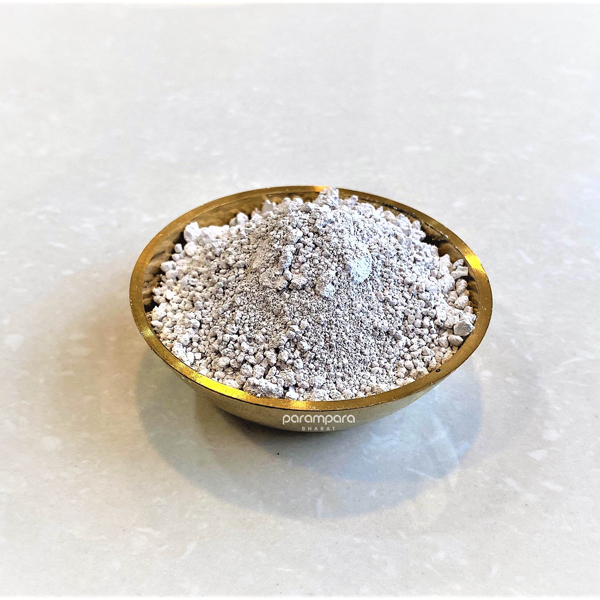

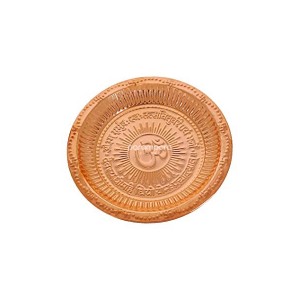
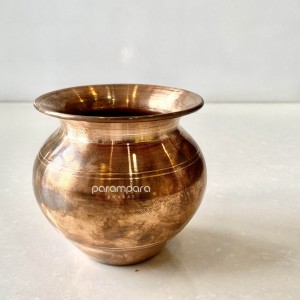
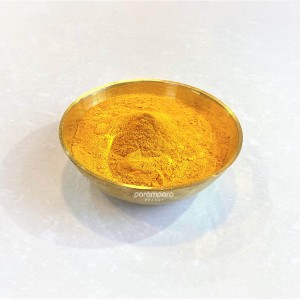
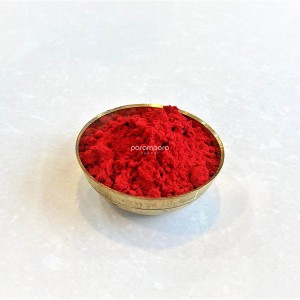
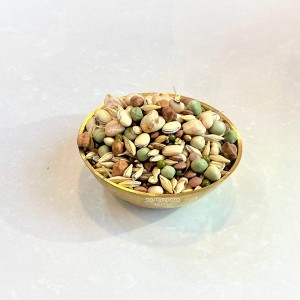

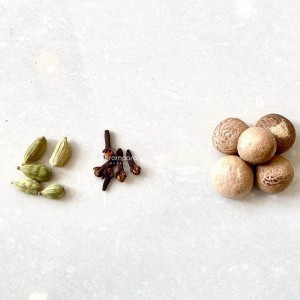
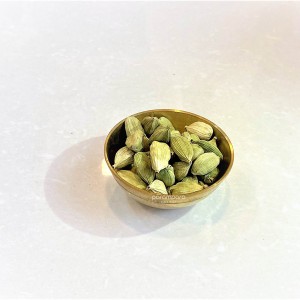
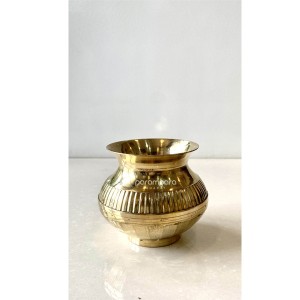
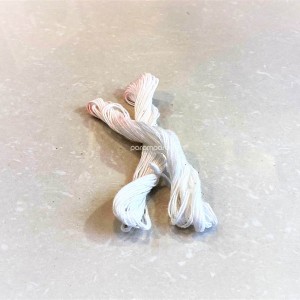


Reviews
There are no reviews yet.